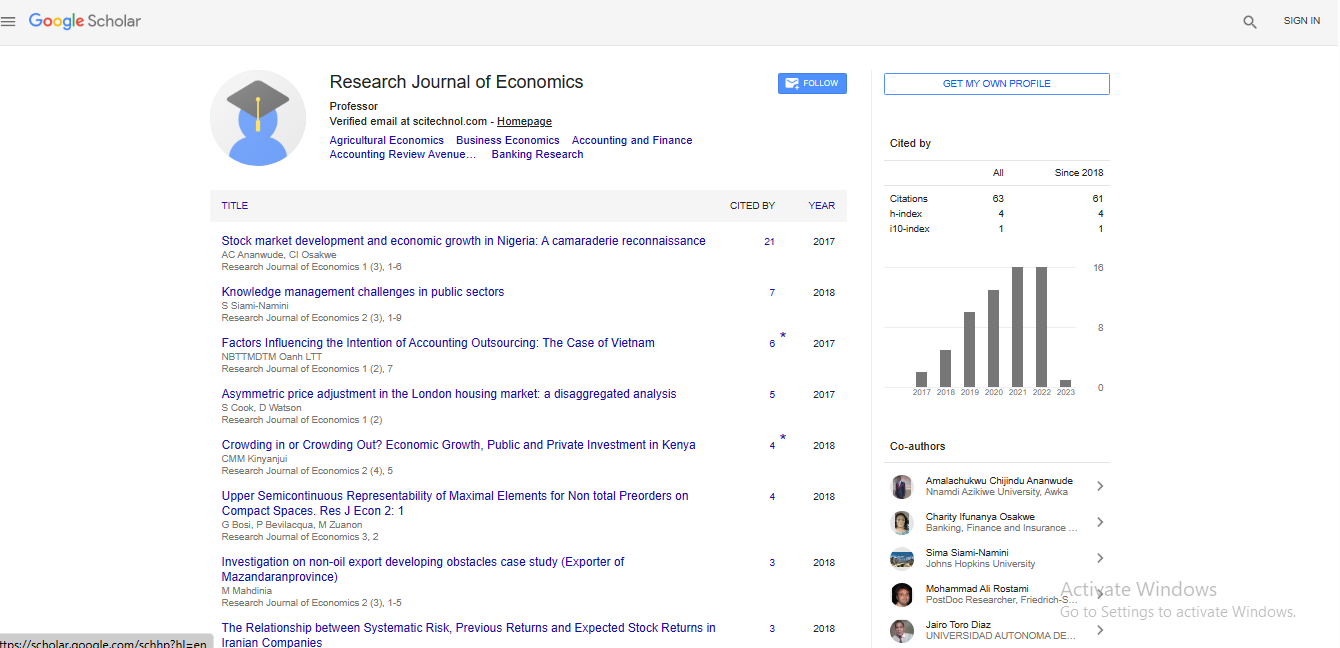Editorial, Res J Econ Vol: 4 Issue: 2
Demand for Money
Nuno Almeida*Department of Economics, Catholic University of Portugal, Lisbon, Portugal
*Corresponding Author : Nuno Almeida
Department of Economics, Catholic University of Portugal, Lisbon, Portugal
E-mail: Almeida_N@gmail.com
Received date: June 29, 2020; Accepted date: July 8, 2020; Published date: July 20, 2020
Citation: Almedia N (2020) Demand for money. Res J Econ 2020, 4:2. DOI: 10.37532/rje.2020.4(2).e102
Abstract
“Demand for money” plays a key role in macroeconomics in general and in monetary economics in particular, a stable feature of demand for money is generally considered important to formulate and enforce an e�?ٴectLve monetary policy. Understanding the demand for money in an economy is an important prerequisite for formulating and conducting monetary policy. Нe demand for money is mainly Lnfluenced by the levels of prices, interest rates, real national output and the pace of finDncLDO innovation. Most of the empirical studies reviewed expressed the money demand functions in real terms and specLfied the models as log-linear with the estimation relying mainly on error correction models. Нe contemporary studies acknowledged the role of changing external and internal economic and finDncLDO landscape, as well as the achievements in the time series econometric estimation of money demand functions. Understanding the demand for money in an economy is an important prerequisite for formulating and conducting monetary policy. Which lists the quantities of a good that buyers are willing to purchase at dL�?ٴerent prices the quantity Нese are important variables that D�?ٴect the production and consumption decisions in an economy. Economic agents are motivated to hold money to facilitate transactions, precautionary and for speculative purposes.
Keywords: Demand, Money, Economics
Editorial
“Demand for money” plays a key role in macroeconomics in general and in monetary economics in particular, a stable feature of demand for money is generally considered important to formulate and enforce an effective monetary policy. Understanding the demand for money in an economy is an important prerequisite for formulating and conducting monetary policy. The demand for money is mainly influenced by the levels of prices, interest rates, real national output and the pace of financial innovation. Most of the empirical studies reviewed expressed the money demand functions in real terms and specified the models as log-linear with the estimation relying mainly on error correction models.
The contemporary studies acknowledged the role of changing external and internal economic and financial landscape, as well as the achievements in the time series econometric estimation of money demand functions. Understanding the demand for money in an economy is an important prerequisite for formulating and conducting monetary policy. Which lists the quantities of a good that buyers are willing to purchase at different prices the quantity These are important variables that affect the production and consumption decisions in an economy. Economic agents are motivated to hold money to facilitate transactions, precautionary and for speculative purposes.
Money underpins all sectors of the economy and ensures operation of economies. The speculative motive bore the liquidity preference theory of money demand and emphasizes the store-of-value function of money. According to this theory, individuals can hold their wealth in either money or bonds and the rate of interest determined the preference for either form of holding wealth. An individual could hold liquid financial assets which offer higher yields than money but involve transactions costs of converting the assets into money, therefore justifying holding money as inventory.
The private sectors hold the cash due to two important functions that are money as a medium of exchange and a store useful. The demand for money for a medium of exchange means money serves to facilitate trade transactions in goods and services, while the demand for money for a store of value means money forms wealth, thanks to the two functions of the cash.
Since money stores value, it is therefore treated as an asset in a portfolio of assets held by an economic unit. Such assets are accompanied by a certain risk and yield expected returns. Judd and Scadding (1982), theorizes that holding money as an asset eases transactions and provides liquidity and safety. Various money demand theories exist that examine demand for money from the transactions, speculative, precautionary and utility perspectives. Sriram (1999) concluded that the theories spurned by these diverse perspectives agree on the variables that determine the demand for money (such as scale variables and opportunity cost variables) but differ on the specific role assigned to each variable in money demand equation. The two major ways: it is quite possibly the object of monetary policy to influence it, and it is a key function in all models of the economy, whether they be large or small. Monetary policy gain a simple, direct leverage on both monetary and real variables in the economy.
 Spanish
Spanish  Chinese
Chinese  Russian
Russian  German
German  French
French  Japanese
Japanese  Portuguese
Portuguese  Hindi
Hindi 